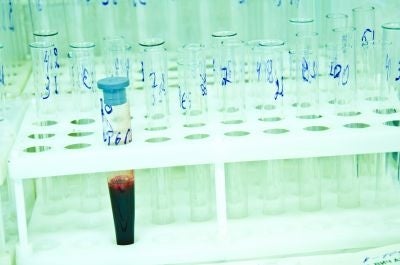Your support helps us to tell the story
From reproductive rights to climate change to Big Tech, The Independent is on the ground when the story is developing. Whether it's investigating the financials of Elon Musk's pro-Trump PAC or producing our latest documentary, 'The A Word', which shines a light on the American women fighting for reproductive rights, we know how important it is to parse out the facts from the messaging.
At such a critical moment in US history, we need reporters on the ground. Your donation allows us to keep sending journalists to speak to both sides of the story.
The Independent is trusted by Americans across the entire political spectrum. And unlike many other quality news outlets, we choose not to lock Americans out of our reporting and analysis with paywalls. We believe quality journalism should be available to everyone, paid for by those who can afford it.
Your support makes all the difference.Scientists reported on Wednesday they had doubled the haul of genes linked with multiple sclerosis (MS), a crippling but baffling disease of the nervous system.
MS, which affects around one person in every thousand, is presumed to have a mix of environmental as well as inherited causes.
The immune system attacks myelin, the protective fatty sheath that swathes the nerve fibres.
As a result, nerve signals get lost, delayed or disrupted, causing problems in coordination, balance, speech and vision, and the problems worsen as the disease progresses.
Publishing in the British journal Nature, an international consortium of researchers identified 29 genes whose variants were strongly associated with MS, plus five other genes also suspected to play a role.
The tally adds to 23 genetic variants known to have a part in this complex disease.
Many of the newly-identified genes are important in the immune system, either controlling interleukins - messenger chemicals that facilitate interactions between immune defences - or T-cells, which attack intruders.
In some cases, they have also been fingered in earlier research in other auto-immune diseases, such as diabetes and Crohn's.
Investigators have previously found that people who are deficient in vitamin D run a higher risk of MS. Bolstering this link, two of the freshly-identified genes play a part in metabolising the vitamin.
The probe entailed trawling through the DNA of 9,772 people with MS in 15 countries, and spotting telltale changes in the code when their genomes were compared with 17,376 otherwise healthy counterparts.
By netting culprit variants of genes, scientists hope to further fundamental knowledge about MS. The hope is to develop better tools to diagnose the disease and - eventually - drugs to protect or even repair the precious myelin.
ri/mb

Join our commenting forum
Join thought-provoking conversations, follow other Independent readers and see their replies
Comments